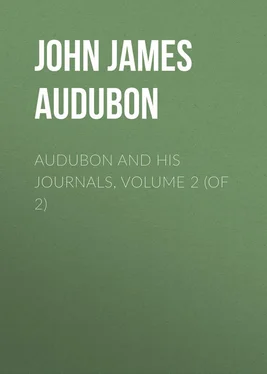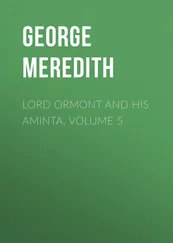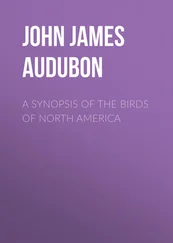John Audubon - Audubon and his Journals, Volume 2 (of 2)
Здесь есть возможность читать онлайн «John Audubon - Audubon and his Journals, Volume 2 (of 2)» — ознакомительный отрывок электронной книги совершенно бесплатно, а после прочтения отрывка купить полную версию. В некоторых случаях можно слушать аудио, скачать через торрент в формате fb2 и присутствует краткое содержание. Жанр: foreign_antique, foreign_prose, на английском языке. Описание произведения, (предисловие) а так же отзывы посетителей доступны на портале библиотеки ЛибКат.
- Название:Audubon and his Journals, Volume 2 (of 2)
- Автор:
- Жанр:
- Год:неизвестен
- ISBN:нет данных
- Рейтинг книги:5 / 5. Голосов: 1
-
Избранное:Добавить в избранное
- Отзывы:
-
Ваша оценка:
- 100
- 1
- 2
- 3
- 4
- 5
Audubon and his Journals, Volume 2 (of 2): краткое содержание, описание и аннотация
Предлагаем к чтению аннотацию, описание, краткое содержание или предисловие (зависит от того, что написал сам автор книги «Audubon and his Journals, Volume 2 (of 2)»). Если вы не нашли необходимую информацию о книге — напишите в комментариях, мы постараемся отыскать её.
Audubon and his Journals, Volume 2 (of 2) — читать онлайн ознакомительный отрывок
Ниже представлен текст книги, разбитый по страницам. Система сохранения места последней прочитанной страницы, позволяет с удобством читать онлайн бесплатно книгу «Audubon and his Journals, Volume 2 (of 2)», без необходимости каждый раз заново искать на чём Вы остановились. Поставьте закладку, и сможете в любой момент перейти на страницу, на которой закончили чтение.
Интервал:
Закладка:
June 8, Thursday. This morning was fair and cold, as you see by the range of the thermometer, 37° to 56°. We started at a very early hour, and breakfasted before five, on account of the village of Gros Ventres, where our captain had to stop. We passed a few lodges belonging to the tribe of the poor Mandans, about all that remained. I only counted eight, but am told there are twelve. The village of the Gros Ventres (Minnetarees) has been cut off from the bank of the river by an enormous sand-bar, now overgrown with willows and brush, and we could only see the American flag flying in the cool breeze. Two miles above this, however, we saw an increasing body of Indians, for the prairie was sprinkled with small parties, on horse and on foot. The first who arrived fired a salute of small guns, and we responded with our big gun. They had an abundance of dogs harnessed to take wood back to the village, and their yells and fighting were severe upon our ears. Some forty or more of the distinguished blackguards came on board; and we had to close our doors as we did yesterday. After a short period they were feasted as last evening; and speeches, coffee, and tobacco, as well as some gunpowder, were given them, which they took away in packs, to be divided afterward. We took one more passenger, and lost our interpreter, who is a trader with the Minnetarees. The latter are by no means as fine-looking a set of men as those we have seen before, and I observed none of that whiteness of skin among them. There were numbers of men, women, and children. We saw a crippled and evidently tame Wolf, and two Indians, following us on the top of the hills. We saw two Swans on a bar, and a female Elk, with her young fawn, for a few minutes. I wished that we had been ashore, as I know full well that the mother would not leave her young; and the mother killed, the young one would have been easily caught alive. We are now stopping for the night, and our men are cutting wood. We have done this, I believe, four times to-day, and have run upward of sixty miles. At the last wood-cutting place, a young leveret was started by the men, and after a short race, the poor thing squatted, and was killed by the stroke of a stick. It proved to be the young of Lepus townsendii [ L. campestris ], large enough to have left the mother, and weighing rather more than a pound. It is a very beautiful specimen. The eyes are very large, and the iris pure amber color. Its hair is tightly, but beautifully curled. Its measurements are as follows [ omitted ]. Bell will make a fine skin of it to-morrow morning. We have had all sorts of stories related to us; but Mr. Kipp, who has been in the country for twenty-two years, is evidently a person of truth, and I expect a good deal of information from him. Our captain told us that on a previous voyage some Indians asked him if, "when the great Medicine" (meaning the steamer) "was tired, he gave it whiskey." Mr. Sire laughed, and told them he did. "How much?" was the query. "A barrelful, to be sure!" The poor wretches at first actually believed him, and went off contented, but were naturally angry at being undeceived on a later occasion. I have now some hope of finding a young of the Antelope alive at Fort Union, as Mr. Kipp left one there about ten days ago. I am now going to bed, though our axemen and "charettes" are still going; and I hope I may not be called up to-morrow morning, to be ready for breakfast at half-past four. Harris and Bell went off with Alexis. Bell fired at a bird, and a large Wolf immediately made its appearance. This is always the case in this country; when you shoot an animal and hide yourself, you may see, in less than half an hour, from ten to thirty of these hungry rascals around the carcass, and have fine fun shooting at them. We have had a windy day, but a good run on the whole. I hope to-morrow may prove propitious, and that we shall reach Fort Union in five more days.
June 9, Friday. Thermometer 42°, 75°, 66°. We had a heavy white frost last night, but we have had a fine, pleasant day on the whole, and to me a most interesting one. We passed the Little Missouri 13 13 "It rises to the west of the Black Mts., across the northern extremity of which it finds a narrow, rapid passage along high perpendicular banks, then seeks the Missouri in a northeasterly direction, through a broken country with highlands bare of timber, and the low grounds particularly supplied with cottonwood, elm, small ash, box, alder, and an undergrowth of willow, red-wood, red-berry, and choke-cherry… It enters the Missouri with a bold current, and is 134 yards wide, but its greatest depth is two feet and a half, which, joined to its rapidity and its sand-bars, makes the navigation difficult except for canoes." ("Lewis and Clark," ed. 1893, pp. 267, 268.) "We came to a green spot at the mouth of the Little Missouri, which is reckoned to be 1670 miles from the mouth of the great Missouri. The chain of blue hills, with the same singular forms as we had seen before, appeared on the other side of this river." ("Travels in North America," Prince of Wied, p. 182.)
(the real one) about ten this morning. It is a handsome stream, that runs all the way from the Black Hills, one of the main spurs of the mighty Rocky Mountains. We saw three Elks swimming across it, and the number of this fine species of Deer that are about us now is almost inconceivable. We have heard of burning springs, which we intend to examine on our way down. We started a Goose from the shore that had evidently young ones; she swam off, beating the water with wings half extended, until nearly one hundred yards off. A shot from a rifle was fired at her, and happily missed the poor thing; she afterwards lowered her neck, sank her body, and with the tip of the bill only above water, kept swimming away from us till out of sight. Afterwards one of the trappers shot at two Geese with two young ones. We landed at four o'clock, and Harris and Bell shot some Bay-winged Buntings and Emberiza pallida , whilst Sprague and I went up to the top of the hills, bounding the beautiful prairie, by which we had stopped to repair something about the engine. We gathered some handsome lupines, of two different species, and many other curious plants. From this elevated spot we could see the wilderness to an immense distance; the Missouri looked as if only a brook, and our steamer a very small one indeed. At this juncture we saw two men running along the shore upwards, and I supposed they had seen an Elk or something else, of which they were in pursuit. Meantime, gazing around, we saw a large lake, where we are told that Ducks, Geese, and Swans breed in great numbers; this we intend also to visit when we come down. At this moment I heard the report of a gun from the point where the men had been seen, and when we reached the steamboat, we were told that a Buffalo had been killed. From the deck I saw a man swimming round the animal; he got on its side, and floated down the stream with it. The captain sent a parcel of men with a rope; the swimmer fastened this round the neck of the Buffalo, and with his assistance, for he now swam all the way, the poor beast was brought alongside; and as the tackle had been previously fixed, it was hauled up on the fore deck. Sprague took its measurements with me, which are as follows: length from nose to root of tail, 8 feet; height of fore shoulder to hoof, 4 ft. 9½ in.; height at the rump to hoof, 4 ft. 2 in. The head was cut off, as well as one fore and one hind foot. The head is so full of symmetry, and so beautiful, that I shall have a drawing of it to-morrow, as well as careful ones of the feet. Whilst the butchers were at work, I was highly interested to see one of our Indians cutting out the milk-bag of the cow and eating it, quite fresh and raw, in pieces somewhat larger than a hen's egg. One of the stomachs was partially washed in a bucket of water, and an Indian swallowed a large portion of this. Mr. Chardon brought the remainder on the upper deck and ate it uncleaned. I had a piece well cleaned and tasted it; to my utter astonishment, it was very good, but the idea was repulsive to me; besides which, I am not a meat-eater, as you know, except when other provisions fail. The animal was in good condition; and the whole carcass was cut up and dispersed among the men below, reserving the nicer portions for the cabin. This was accomplished with great rapidity; the blood was washed away in a trice, and half an hour afterwards no one would have known that a Buffalo had been dressed on deck. We now met with a somewhat disagreeable accident; in starting and backing off the boat, our yawl was run beneath the boat; this strained it, and sprung one of the planks so much that, when we landed on the opposite side of the river, we had to haul it on shore, and turn it over for examination; it was afterwards taken to the forecastle to undergo repairs to-morrow, as it is often needed. Whilst cutting wood was going on, we went ashore. Bell shot at two Buffaloes out of eight, and killed both; he would also have shot a Wolf, had he had more bullets. Harris saw, and shot at, an Elk; but he knows little about still hunting, and thereby lost a good chance. A negro fire-tender went off with his rifle and shot two of Townsend's Hares. One was cut in two by his ball, and he left it on the ground; the other was shot near the rump, and I have it now hanging before me; and, let me tell you, that I never before saw so beautiful an animal of the same family. My drawing will be a good one; it is a fine specimen, an old male. I have been hearing much of the prevalence of scurvy, from living so constantly on dried flesh, also about the small-pox, which destroyed such numbers of the Indians. Among the Mandans, Riccarées, and Gros Ventres, hundreds died in 1837, only a few surviving; and the Assiniboins were nearly exterminated. Indeed it is said that in the various attacks of this scourge 52,000 Indians have perished. This last visitation of the dread disease has never before been related by a traveller, 14 14 At this time the account of the Prince of Wied had not been published in English; that translation appeared December, 1843, two years after the German edition.
and I will write more of it when at Fort Union. It is now twenty minutes to midnight; and, with walking and excitement of one kind or another, I am ready for bed. Alexis and another hunter will be off in an hour on a hunt.
Интервал:
Закладка:
Похожие книги на «Audubon and his Journals, Volume 2 (of 2)»
Представляем Вашему вниманию похожие книги на «Audubon and his Journals, Volume 2 (of 2)» списком для выбора. Мы отобрали схожую по названию и смыслу литературу в надежде предоставить читателям больше вариантов отыскать новые, интересные, ещё непрочитанные произведения.
Обсуждение, отзывы о книге «Audubon and his Journals, Volume 2 (of 2)» и просто собственные мнения читателей. Оставьте ваши комментарии, напишите, что Вы думаете о произведении, его смысле или главных героях. Укажите что конкретно понравилось, а что нет, и почему Вы так считаете.












